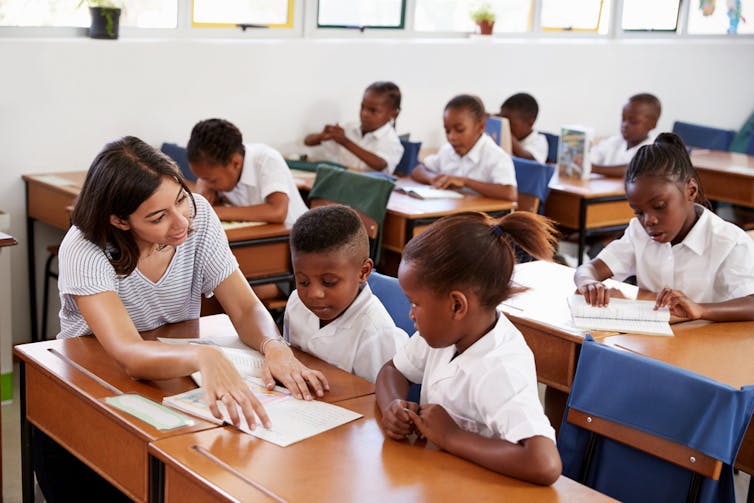Teachers feel excluded from South Africa’s schools by race and culture

Monkey Business Images/Shutterstock
Emotions ran high at a high school south of Johannesburg in 2017 when the largely coloured community rejected the appointment of a black principal. A group of black teachers were also removed from the school because coloured parents didn’t want them there.
The apartheid system delineated people using racial categories – white, black, Indian and coloured – and these continue to influence post-apartheid South African society.
This high school’s story is just one example of the many types of exclusion teachers face regularly. The problem is that debates about exclusion focus almost exclusively on the experiences of learners as they try to overcome barriers of race, culture, gender, sexuality, class, disability and language.
Yet teachers also have difficulties around inclusion, participation and belonging in post-apartheid schools. Many have migrated from historically black to historically white schools because these tend to be better resourced, classes are smaller, safer school environments, more learning support services and in some cases higher salaries.
But being employed by a school doesn’t automatically guarantee inclusion. A study I conducted with my colleague Professor Yusef Waghid showed that even when black teachers are hired at historically white schools, they have to deal with constant questions about their “competence” and whether their work is in line with a school’s stated “standards”. Education experts argue that the term “standards” is often used to justify profoundly racialised conceptions of a diametrically opposed “white competence” and “black incompetence”.
The ongoing exclusion of particular teachers from schools – whether on the basis of race, religion, culture, or sexuality – has serious implications for learners as well as the curriculum. On the one hand, learners do not encounter the life-worlds of diverse teachers. On the other hand, learners from minority groups struggle to find points of resonance. This leaves them with no option but to assimilate into the dominant way of thinking and being.
Learners benefit from being exposed to multiple and unfamiliar teacher identities. They begin to experience those they previously might not have encountered. They enter life-worlds which they otherwise might not have known.
It’s time that policymakers paid serious attention to the problem of teacher exclusion.
Teachers feel excluded
One of the people involved in our study – a black woman – was appointed as a maths teacher at a school that taught predominantly coloured children. She was only allowed to teach Mathematical Literacy (a subject that involves basic problem-solving). The school said this was because she required “mentoring”, even though she was qualified and had prior experience as a maths teacher.
Another participant in our study, a South African of Indian descent, was appointed at a school of mostly white learners. He faced continuous complaints from parents whose children apparently couldn’t understand his accent. The teacher left the school after only 10 months. His decision was prompted by the principal asking whether he would be taking leave to celebrate the Muslim festival of Eid. The principal had seemingly failed to realise that he was in fact not Muslim, but a practising Hindu.
But these issues aren’t being addressed. Perhaps one of the reasons is that South Africans are preoccupied with trying to adhere to what can be measured in an employment equity framework as set out in the country’s laws.
As American political theorist and feminist Marion Iris Young, however, points out these frameworks don’t necessarily equate to inclusive processes of recognition, participation or respect. Teachers might be employed at a particular school but their presence doesn’t equal participation.
Humans are caught up in a world of perception and cannot extricate ourselves from it. Consequently, in a country whose history is so marred by racism and colonialism, many South Africans can’t imagine that a “black” teacher is a “competent” teacher anymore than they can imagine that they might be able to learn from a teacher with an “Indian” accent.
What’s needed is a different way of looking at the world. Schools offer spaces where learners can be exposed to difference and diversity through employing teachers from across racial, cultural and religious lines. Policy is insufficient in cultivating these spaces. The onus rests on both school leadership and governance structures to realise their responsibility in preparing learners for what it means to participate in a pluralist society. One way of cultivating a more inclusive and diverse school environment for learners is through including diverse teachers.
Solutions
Tackling teacher exclusion can create an environment where teachers and learners remain conscious that there’s more to know and more to include. This is because the exclusion of any individual or group within a teaching space is, in fact, a shutting down of the imagination and uncertainty. Exclusion instils a smaller world. It promotes sameness, and defuses dissonance. It diminishes people’s capacity for critical engagement.
![]() Beyond government taking action to remedy the situation, teachers also need to assert their authority and contest historical apartheid-era images of power through race and culture or ethnicity. It’s only through questioning that others can be drawn into deliberative engagements and debates. This affirms people’s presence and is an opportunity to see them as they are. South Africa’s classrooms will be better places if these perceptions begin to shift.
Beyond government taking action to remedy the situation, teachers also need to assert their authority and contest historical apartheid-era images of power through race and culture or ethnicity. It’s only through questioning that others can be drawn into deliberative engagements and debates. This affirms people’s presence and is an opportunity to see them as they are. South Africa’s classrooms will be better places if these perceptions begin to shift.
Nuraan Davids, Associate Professor of Philosophy of Education, Stellenbosch University
This article was originally published on The Conversation.
Written by: Natasha
Similar posts
MORE ARTICLES

SA Powerball Results for tonight: Tuesday, 01July 2025

Zenande Mfenyana captures viewers’ hearts as Thumeka on ‘Inimba’

WATCH: Scorpion Kings begin preparations to ‘Fill Up’ Loftus Stadium

The best of Point of View: DA dares Ramaphosa, Nairobi protests turn deadly and Chrispin Phiri in the spotlight

New month brings new electricity bills for City Power customers
QUICK LINKS
UpComing Shows

The Best T in the City
With T Bose
He has held it down in the world of mid-morning radio with the best music, riveting topics, brilliant mixes and interesting guests. Every weekday, The Best T proves why he is the BEST by connecting to you like only your bro or favourite uncle could. He lets his listeners dictate the songs they want to hear in the ever-popular Top 10 at 10, and his Three Teaspoons never run out. Catch The Best T in the City Mondays to Fridays from 09h00 to 12h00.
close
Feel Good
With Andy Maqondwana
Feel good about feeling good! That's exactly what The Feel-Good show is about. An escape from the negativity that surrounds us, indulging you in good feels. Pass it on to one and all. Spread the good feeling around Gauteng with Andy Maqondwana.
close
Kaya Biz
With Gugulethu Mfuphi
The world of business is simplified for you by Kaya Biz with Gugulethu Mfuphi. This fast-paced award-winning business show talks to the corporate giants as well as up and coming entrepreneurs about their wins and challenges. Gugulethu invites guests to offer their analyses of markets and economies, and also delves into issues of personal financial wellness. Kaya Biz airs Mondays to Thursdays 18h00 to 19h00.
close
Point of View
With Phemelo Motene
Point of View with Phemelo Motene delves into the day’s current affairs, touches on real issues that affect people’s daily lives and shares expert advice on questions posed by the audience. Mondays to Thursdays 20:00 to 22:00.
closeConnect with Kaya 959
DownLoad Our Mobile App
© 2025 Kaya 959 | On The Street On The Air











